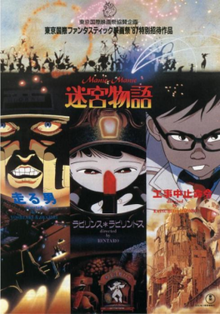Neo Tokyo (film)
| Neo Tokyo | |
|---|---|

Japanese theatrical poster
|
|
| Japanese | 迷宮物語 |
| Hepburn | Meikyū Monogatari |
| Directed by |
|
| Produced by | Masao Maruyama |
| Written by |
|
| Based on |
Meikyū Monogatari by Taku Mayumura |
| Starring | |
| Music by | Mickie Yoshino |
| Cinematography | Kin'ichi Ishikawa |
| Edited by | Harutoshi Ogata |
|
Production
company |
|
| Distributed by | Toho |
|
Release date
|
|
|
Running time
|
50 minutes |
| Country | Japan |
| Language | Japanese |
Neo Tokyo (迷宮物語 Meikyū Monogatari?, literally "Labyrinth Tales"), also titled Manie-Manie on its title card, is a 1987 anime science fiction anthology film produced by Project Team Argos and Madhouse. Conceived and produced by Madhouse founders Masao Maruyama and Rintaro, it adapts short stories by Taku Mayumura featured in the 1986 collection of the same Japanese title and is executive produced by publisher Haruki Kadokawa.
The 50 minute-long film has three segments, each under a different screenwriter and film director: Rintaro's "Labyrinth Labyrinthos," an exploration into the maze of a little girl's mind, Yoshiaki Kawajiri's "Running Man," focusing on a deadly auto race, and Katsuhiro Ōtomo's "Construction Cancellation Order," a cautionary tale about man's dependency on technology. In addition to original music by Godiego's Mickie Yoshino, two prominently feature famous pieces of Western classical music: the first of Erik Satie's Gymnopédies and the "Toreador Song" of Georges Bizet's Carmen in "Labyrinth" and "Morning Mood" from Edvard Grieg's Peer Gynt score, in an ironic manner, in "The Order."
...
Wikipedia
